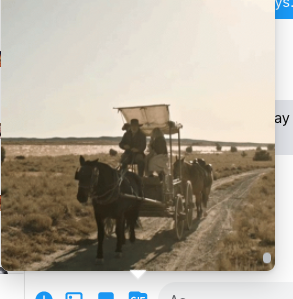Like all good ideas on this blogsite, the present escapade originated from two different people and started out as two different ideas. BBF’s idea was for J to help her improve her French pronunciation by means of everyday French phrases.
J’s idea was to document typical French phrases, used by the people of Auzon. This would be intended to inform second homers and to provide material for his blogsite.
As a result of a high noon shoot out over a bok panache at the Table du Charbon, the following compromise was signed and settled.
BBF would get to practise her French pronunciation with J’s help; but using J’s Auzon phrases. It was also decided to add a version for first homers in English, to help bridge the language and cultural divide and make it all more inclusive. Other people could also contribute in the fullness of time, if the scheme got going. The phrases and their meaning would be posted on the blogsite.
The first (rather extended) phrase, selected by BBF and agreed by J is:
- ‘FAIRE PIPI SUR LE GAZON’ – a French young boys’ song Often sung when performing the associated actions. How do I know? Guess! Of course, the butterflies and the lady birds were far too fast for us…….
J’fais pipi sur le gazon
Pour embêter les coccinelles;
J’fais pipi sur le gazon
Pour embeter les papillons.
Pipi, gazon, papillons, coccinelles,
Pipi, gazon, coccinelles, papillons.
PEEING ON THE GRASS
I pee on the grass
To annoy the ladybirds
I pee on the grass to annoy the butterflies
Pee, grass, butterflies, ladybirds,
Pee, grass, ladybirds, butterflies
BBF is making good progress with her pronunciation of these words. Of course, the repetitions help…….but unclear when she actually uses the phrases. I leave it to her to explain her selection…..
2. ‘A bird in the hand is worth two in the bush’.
The meaning here essentially derives from the idea that birds in the wild are hard to catch. Think for a minute how difficult it would be to catch a crow or a seagull or even a robin, not to mention a buzzard or a swan. So, if you are lucky to have caught one bird (that is to say, the one ‘in the hand’), better that you hang on to it than have to catch another pesky bird…..
‘Un tiens vaut mieux que deux tu l’auras’
The meaning here derives from the present actual to the future ‘maybe’. Having anything now is better than having it in the future. Of course, it is understood that the future might never realise itself. A bit like tomorrow never comes (because, when it does, it is today……).
Pour nos amis et amies auvergnats – le sens ici dérive du présent actuel au futur ‘peut-être’. Il vaut mieux avoir quelque chose maintenant que de l’avoir dans le futur. Bien sûr, il est entendu que l’avenir pourrait ne jamais se réaliser. Un peu comme demain ne vient jamais (car, quand ça arrive, c’est aujourd’hui ……).
For BBF, payment of half a bill is better than a promise of paying the full bill later…..
The phrase is a good one to practise French vowels, not a lot by way of consonants….come on BBF, let’s hear you and nice and loud too…….

3. ‘Putting the cart before the horse’.
B’s choice. If you put the cart, before the horse, the horse cannot pull the cart…..It means get things in order or they won’t work. For example, don’t put stuff on the menu, before you have bought the provisions, that are needed to cook it.
In French, the saying is ‘metre la charrue avant les boeufs’ – ‘putting the plough before the oxen/steers/bullocks’. Boeufs has a number of different translations, as can be seen. Il faut faire les choses dans le bon ordre/l’ordre correct, sinon, ca ne marchera pas. Il ne faut pas chauffer l’eau pour cuire les oeufs, si auparavant, on n’a pas acheté des oeufs……bien simple, n’est-ce pas? Mais on le fait tout le temps d’une façon ou d’une autre.

4. ‘Dis donc’
This is an expression you’ll hear used a lot in everyday conversion and it’s a great to drop in here and there yourself if you want to sound authentically French.
So what exactly does it mean?
Dis donc has several translations into English.
While it literally means ‘say then’ it would really be equivalent to ‘wow’, ‘goodness’, ‘hey!’, ‘well,’ and ‘listen’ and is usually used to express surprise or admiration.
But it can also be used to reinforce a negative comment, such as in the following example: Dis donc, tu es à ma place, là! (Hey! you’re in my spot!).
You can also tack on other words to give the expression a slightly different meaning.
For example, Bah, dis donc! might sound more like a noise likely to come from a percussion instrument but if you use it in French conversation it means ‘Well, I never!’ or ‘You don’t say!’.
Similarly, Eh bien, dis donc! can also mean ‘Well, I never!’ or ‘You don’t say!’ and if used in an ironic way means ‘Oh don’t mind me!’ and ‘That’s quite alright!’.
It’s also worth noting that Dis donc is the tu form of this expression, the plural or formal vous form is Dites donc and you’re much more likely to hear it conversation than in written form.
ExamplesJe ne savais pas qu’on pouvait passer par là dis donc! – Well, I didn’t know we could go this way. Dis donc, tu es très en beauté ce soir! – Wow, you look very beautiful this evening! (The above two examples come from wordreference.com) Dites donc, j’ai vu vos grandparents samedi soir. – By the way, I saw your grandparents Saturday night.
The English version has been addressed above. ‘Dis donc’ does a lot of different work. Try to make it work for you. Also, note carefully how French people use it.
5. ‘It’s colder than a witch’s titty’ also ‘It’s colder than a witch’s titty in a brass brassiere’.
‘Tit’ for ‘titty’ is also acceptable.
The phrase means that it is very cold – freezing, in fact.
The expression in French is ‘Il fait un froid de canard’.
Becky will need this in Auzon in the winter, when it can get very cold…….un vrai froid de canard! Brass brassieres not recommended…….
6. ‘We do what we can with what we have’.
The French version is ‘on fait ce qu’on peut avec ce qu’on a’.
This is a very popular expression, which is heard all the time in Auzon, by almost everyone. However, it is used particularly by people (or indeed yourself) doing work on your house or garden. It can be understood in 2 very different ways.
The first way means something like ‘we do/did our best’. If the work is well done, it’s a sort of self-complement. ‘We did the work. It was well-done. We do good work. Here is the evidence.
If the work is badly done, it’s more of an excuse. ‘We did the best we can, we do work well but the work was just too difficult/tricky/impossible. Of course, it might also mean ‘We did the work. The work was not done well. It was not our fault, because we did not have what was needed to do the work well’. In the latter case, the blame is assigned to the commissioner of the work – Male being too stingy with materials or somesuch.
Becky can have so much fun with this one. More than you can shake a stick at…..